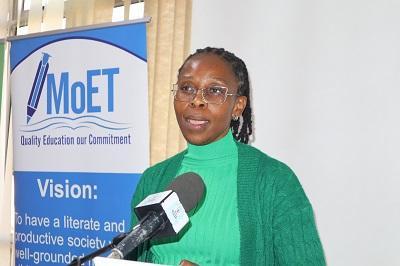Africa-Press – Lesotho. Three key ministries: Labour and Employment; Education and Training; and, Trade, Industry and Business Development recently held a joint meeting to discuss the implementation of the Dual Learning Model (DLM) in Lesotho.
DLM is designed to bridge the skills gap by combining classroom education with practical, workplace experience. This approach aims to better prepare young people for the labour market by aligning their training with the actual needs of employers.
The model is not new to the country. Back in 2019, the three ministries signed a Memorandum of Understanding (MoU) committing to work together to implement DLM.
The goal is to enhance youth employability, support business growth, and ultimately boost Lesotho’s economy.
Speaking during the meeting, Minister of Labour and Employment, Hon. Tšeliso Mokhosi, emphasised the urgent need for collaboration among educational institutions, industries, and government departments to ensure that young people are equipped with relevant and practical skills.
Mokhosi said this model is one of the many initiatives the government is working on.
“The government of Lesotho is embarking on these initiatives to not only promote employability of learners, but to further reduce the scale of higher unemployment, particularly among youth,” said Mokhosi.
He said the main goal of this model will be the employability of graduates, which will include developing short-term courses that will focus on the industries’ trends and needs.
On behalf of Competitiveness and Financial Inclusion (CAFI) , Chaba Mokuku said CAFI’s main objective is to grow Small and Medium Sized Enterprises (SMEs), adding that CAFI has M47 million set aside to support 10 training institutes.
Mokuku said CAFI equips SMEs with skills, marketing and procurement of equipment for a few selected SMEs.
According to him, they have already incubated 150 of such entities and plan to equip 500 SMEs by 2028.
On behalf of Ministry of Education and Training, Retšelisitsoe Moiloa said the learning model is designed to bridge the gap between the education and working space.
She further highlighted that the new model makes it easier for employers to recruit workers specific for the job they are offering, with the skills they need.
She highlighted that all those involved are to benefit, from socio-economic growth, job creation, reduction of skills mismatch and enhanced productivity.
However, Moiloa said there are still challenges to be expected on this since “many institutions fail in researching what businesses need, while others fail to train learners with the skills businesses need.”
“As we continue to face high youth unemployment, the successful rollout of the Dual Learning Model could become a turning point in shaping a stronger, more resilient economy,” Moiloa added.
For More News And Analysis About Lesotho Follow Africa-Press






